MBA502: Self-Assessment Essay on Emotional Intelligence and Diversity
VerifiedAdded on 2022/10/04
|8
|1522
|345
Essay
AI Summary
This essay presents a student's self-assessment of their emotional intelligence, based on the results of the Global Emotional Intelligence Test (GEIT) and Daniel Goleman's EQ test, as well as feedback from friends and colleagues. The student utilizes the Johari Window model to analyze the discrepancies between their self-perception and the perceptions of others. The essay highlights the student's strengths in self-awareness and self-management, while identifying weaknesses in social awareness and relationship management, particularly in the context of culturally diverse organizations. The student then outlines strategies for improvement, including managing negative emotions, enhancing communication, practicing empathy, and developing resilience to adversity. The essay concludes by emphasizing the importance of emotional intelligence for building leadership skills and fostering effective relationships in the workplace.
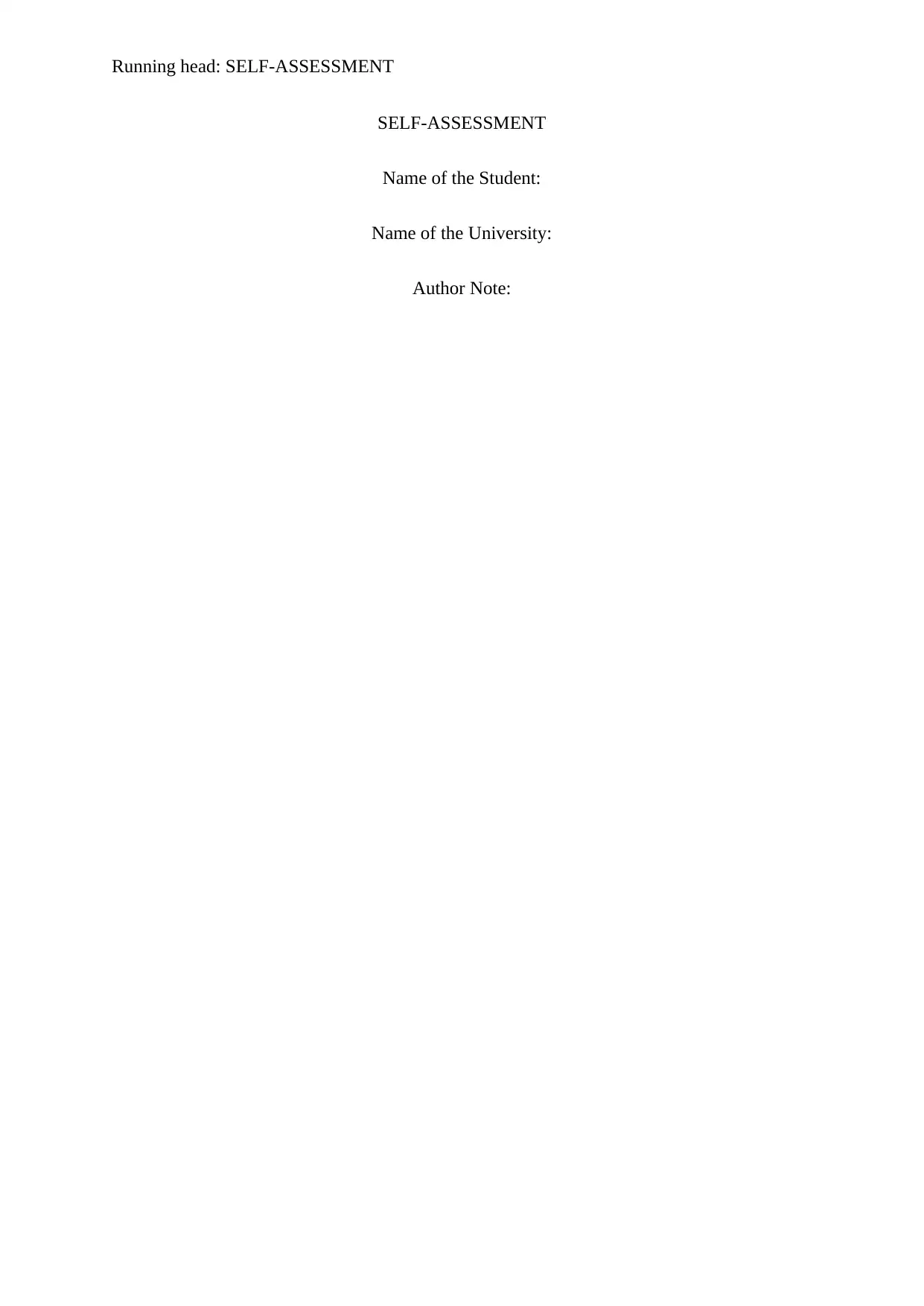
Running head: SELF-ASSESSMENT
SELF-ASSESSMENT
Name of the Student:
Name of the University:
Author Note:
SELF-ASSESSMENT
Name of the Student:
Name of the University:
Author Note:
Paraphrase This Document
Need a fresh take? Get an instant paraphrase of this document with our AI Paraphraser
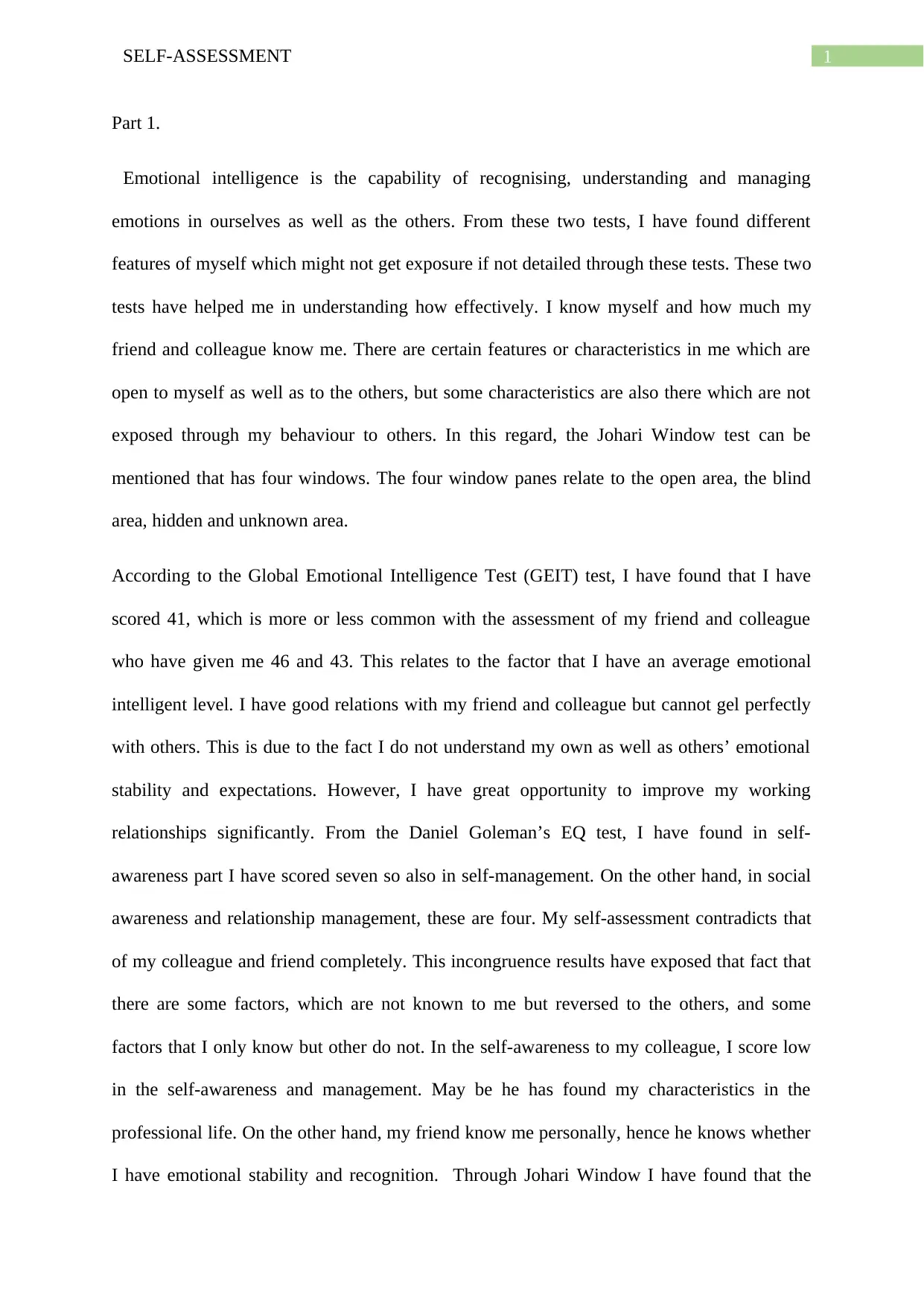
1SELF-ASSESSMENT
Part 1.
Emotional intelligence is the capability of recognising, understanding and managing
emotions in ourselves as well as the others. From these two tests, I have found different
features of myself which might not get exposure if not detailed through these tests. These two
tests have helped me in understanding how effectively. I know myself and how much my
friend and colleague know me. There are certain features or characteristics in me which are
open to myself as well as to the others, but some characteristics are also there which are not
exposed through my behaviour to others. In this regard, the Johari Window test can be
mentioned that has four windows. The four window panes relate to the open area, the blind
area, hidden and unknown area.
According to the Global Emotional Intelligence Test (GEIT) test, I have found that I have
scored 41, which is more or less common with the assessment of my friend and colleague
who have given me 46 and 43. This relates to the factor that I have an average emotional
intelligent level. I have good relations with my friend and colleague but cannot gel perfectly
with others. This is due to the fact I do not understand my own as well as others’ emotional
stability and expectations. However, I have great opportunity to improve my working
relationships significantly. From the Daniel Goleman’s EQ test, I have found in self-
awareness part I have scored seven so also in self-management. On the other hand, in social
awareness and relationship management, these are four. My self-assessment contradicts that
of my colleague and friend completely. This incongruence results have exposed that fact that
there are some factors, which are not known to me but reversed to the others, and some
factors that I only know but other do not. In the self-awareness to my colleague, I score low
in the self-awareness and management. May be he has found my characteristics in the
professional life. On the other hand, my friend know me personally, hence he knows whether
I have emotional stability and recognition. Through Johari Window I have found that the
Part 1.
Emotional intelligence is the capability of recognising, understanding and managing
emotions in ourselves as well as the others. From these two tests, I have found different
features of myself which might not get exposure if not detailed through these tests. These two
tests have helped me in understanding how effectively. I know myself and how much my
friend and colleague know me. There are certain features or characteristics in me which are
open to myself as well as to the others, but some characteristics are also there which are not
exposed through my behaviour to others. In this regard, the Johari Window test can be
mentioned that has four windows. The four window panes relate to the open area, the blind
area, hidden and unknown area.
According to the Global Emotional Intelligence Test (GEIT) test, I have found that I have
scored 41, which is more or less common with the assessment of my friend and colleague
who have given me 46 and 43. This relates to the factor that I have an average emotional
intelligent level. I have good relations with my friend and colleague but cannot gel perfectly
with others. This is due to the fact I do not understand my own as well as others’ emotional
stability and expectations. However, I have great opportunity to improve my working
relationships significantly. From the Daniel Goleman’s EQ test, I have found in self-
awareness part I have scored seven so also in self-management. On the other hand, in social
awareness and relationship management, these are four. My self-assessment contradicts that
of my colleague and friend completely. This incongruence results have exposed that fact that
there are some factors, which are not known to me but reversed to the others, and some
factors that I only know but other do not. In the self-awareness to my colleague, I score low
in the self-awareness and management. May be he has found my characteristics in the
professional life. On the other hand, my friend know me personally, hence he knows whether
I have emotional stability and recognition. Through Johari Window I have found that the
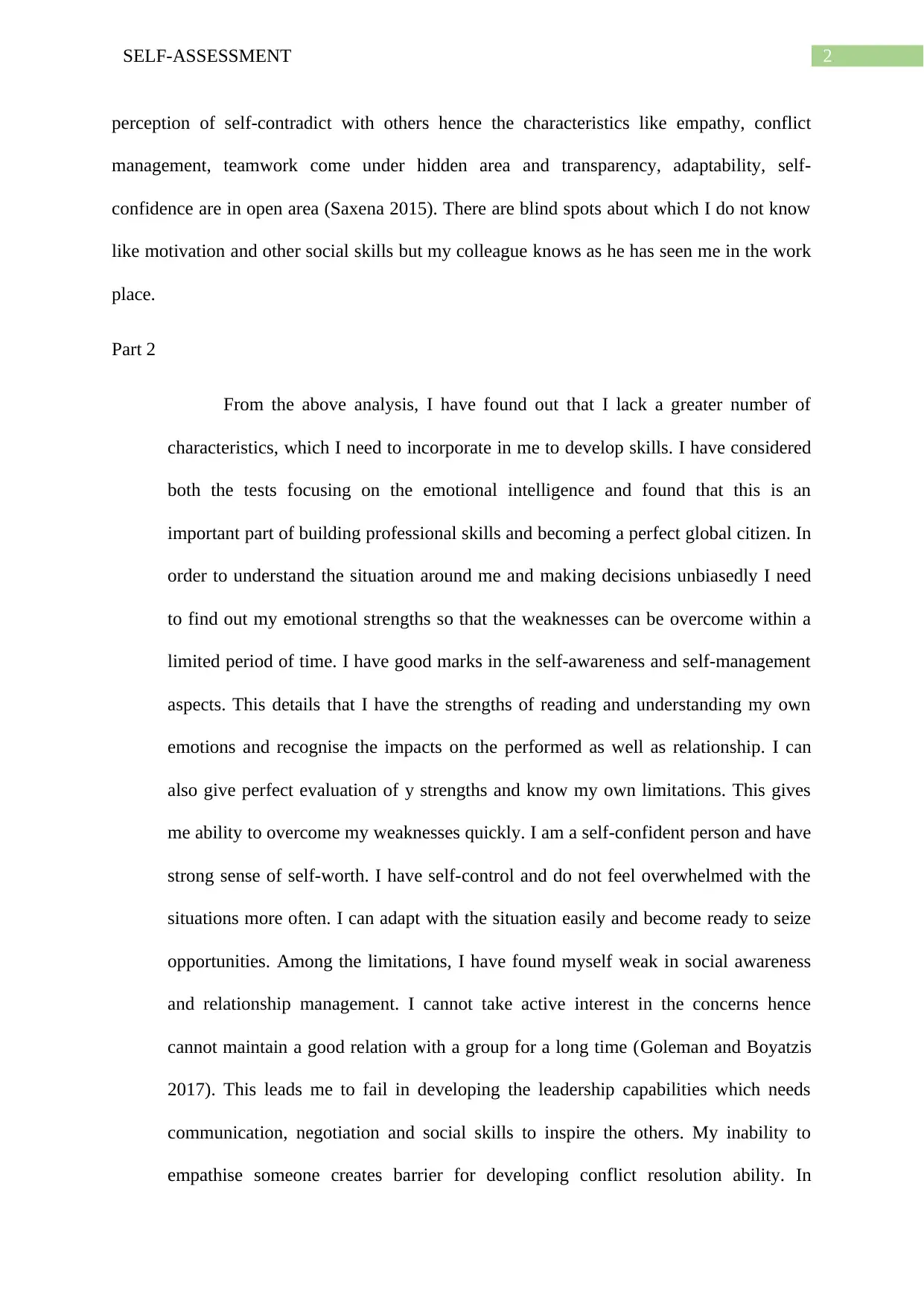
2SELF-ASSESSMENT
perception of self-contradict with others hence the characteristics like empathy, conflict
management, teamwork come under hidden area and transparency, adaptability, self-
confidence are in open area (Saxena 2015). There are blind spots about which I do not know
like motivation and other social skills but my colleague knows as he has seen me in the work
place.
Part 2
From the above analysis, I have found out that I lack a greater number of
characteristics, which I need to incorporate in me to develop skills. I have considered
both the tests focusing on the emotional intelligence and found that this is an
important part of building professional skills and becoming a perfect global citizen. In
order to understand the situation around me and making decisions unbiasedly I need
to find out my emotional strengths so that the weaknesses can be overcome within a
limited period of time. I have good marks in the self-awareness and self-management
aspects. This details that I have the strengths of reading and understanding my own
emotions and recognise the impacts on the performed as well as relationship. I can
also give perfect evaluation of y strengths and know my own limitations. This gives
me ability to overcome my weaknesses quickly. I am a self-confident person and have
strong sense of self-worth. I have self-control and do not feel overwhelmed with the
situations more often. I can adapt with the situation easily and become ready to seize
opportunities. Among the limitations, I have found myself weak in social awareness
and relationship management. I cannot take active interest in the concerns hence
cannot maintain a good relation with a group for a long time (Goleman and Boyatzis
2017). This leads me to fail in developing the leadership capabilities which needs
communication, negotiation and social skills to inspire the others. My inability to
empathise someone creates barrier for developing conflict resolution ability. In
perception of self-contradict with others hence the characteristics like empathy, conflict
management, teamwork come under hidden area and transparency, adaptability, self-
confidence are in open area (Saxena 2015). There are blind spots about which I do not know
like motivation and other social skills but my colleague knows as he has seen me in the work
place.
Part 2
From the above analysis, I have found out that I lack a greater number of
characteristics, which I need to incorporate in me to develop skills. I have considered
both the tests focusing on the emotional intelligence and found that this is an
important part of building professional skills and becoming a perfect global citizen. In
order to understand the situation around me and making decisions unbiasedly I need
to find out my emotional strengths so that the weaknesses can be overcome within a
limited period of time. I have good marks in the self-awareness and self-management
aspects. This details that I have the strengths of reading and understanding my own
emotions and recognise the impacts on the performed as well as relationship. I can
also give perfect evaluation of y strengths and know my own limitations. This gives
me ability to overcome my weaknesses quickly. I am a self-confident person and have
strong sense of self-worth. I have self-control and do not feel overwhelmed with the
situations more often. I can adapt with the situation easily and become ready to seize
opportunities. Among the limitations, I have found myself weak in social awareness
and relationship management. I cannot take active interest in the concerns hence
cannot maintain a good relation with a group for a long time (Goleman and Boyatzis
2017). This leads me to fail in developing the leadership capabilities which needs
communication, negotiation and social skills to inspire the others. My inability to
empathise someone creates barrier for developing conflict resolution ability. In
⊘ This is a preview!⊘
Do you want full access?
Subscribe today to unlock all pages.

Trusted by 1+ million students worldwide
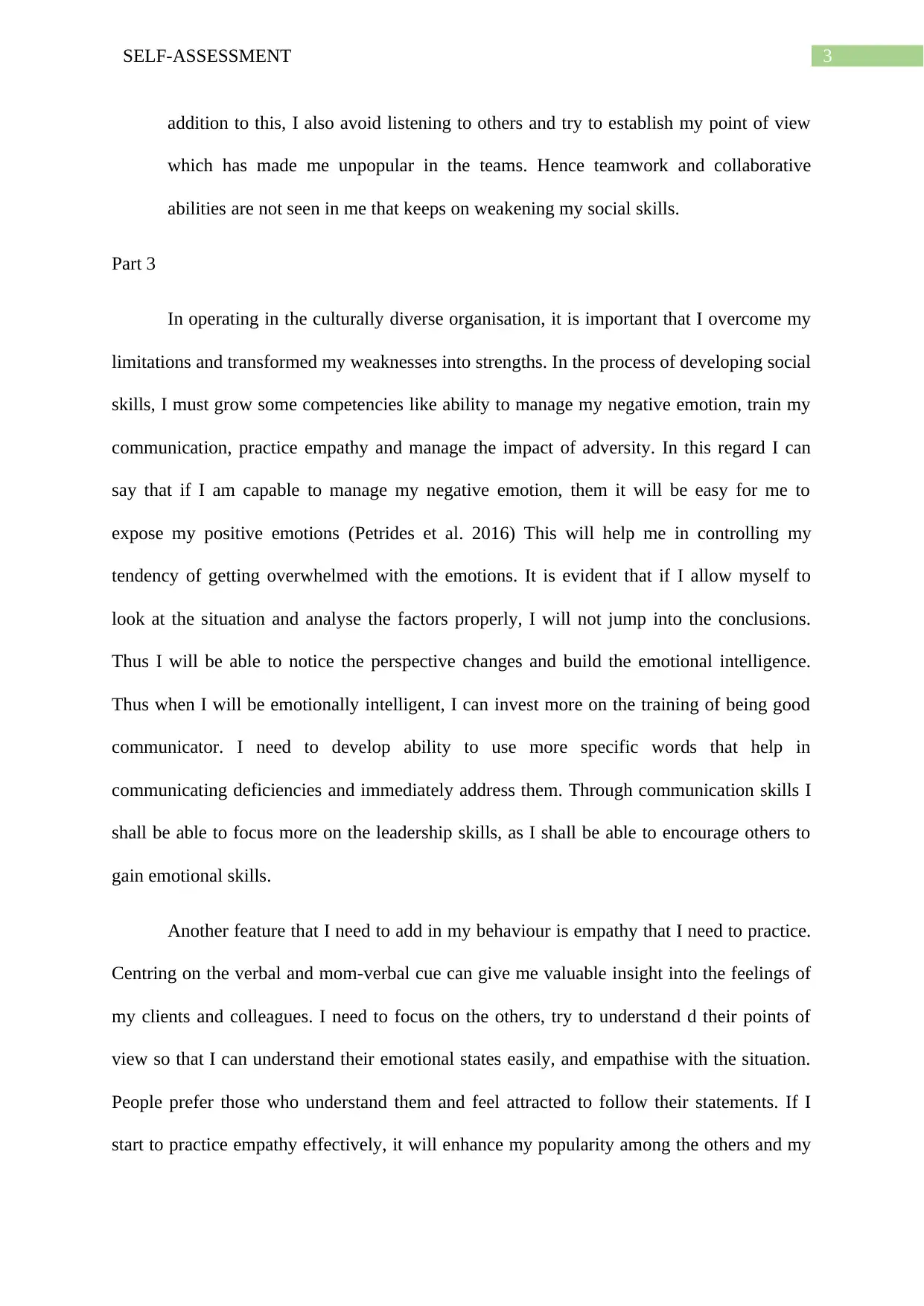
3SELF-ASSESSMENT
addition to this, I also avoid listening to others and try to establish my point of view
which has made me unpopular in the teams. Hence teamwork and collaborative
abilities are not seen in me that keeps on weakening my social skills.
Part 3
In operating in the culturally diverse organisation, it is important that I overcome my
limitations and transformed my weaknesses into strengths. In the process of developing social
skills, I must grow some competencies like ability to manage my negative emotion, train my
communication, practice empathy and manage the impact of adversity. In this regard I can
say that if I am capable to manage my negative emotion, them it will be easy for me to
expose my positive emotions (Petrides et al. 2016) This will help me in controlling my
tendency of getting overwhelmed with the emotions. It is evident that if I allow myself to
look at the situation and analyse the factors properly, I will not jump into the conclusions.
Thus I will be able to notice the perspective changes and build the emotional intelligence.
Thus when I will be emotionally intelligent, I can invest more on the training of being good
communicator. I need to develop ability to use more specific words that help in
communicating deficiencies and immediately address them. Through communication skills I
shall be able to focus more on the leadership skills, as I shall be able to encourage others to
gain emotional skills.
Another feature that I need to add in my behaviour is empathy that I need to practice.
Centring on the verbal and mom-verbal cue can give me valuable insight into the feelings of
my clients and colleagues. I need to focus on the others, try to understand d their points of
view so that I can understand their emotional states easily, and empathise with the situation.
People prefer those who understand them and feel attracted to follow their statements. If I
start to practice empathy effectively, it will enhance my popularity among the others and my
addition to this, I also avoid listening to others and try to establish my point of view
which has made me unpopular in the teams. Hence teamwork and collaborative
abilities are not seen in me that keeps on weakening my social skills.
Part 3
In operating in the culturally diverse organisation, it is important that I overcome my
limitations and transformed my weaknesses into strengths. In the process of developing social
skills, I must grow some competencies like ability to manage my negative emotion, train my
communication, practice empathy and manage the impact of adversity. In this regard I can
say that if I am capable to manage my negative emotion, them it will be easy for me to
expose my positive emotions (Petrides et al. 2016) This will help me in controlling my
tendency of getting overwhelmed with the emotions. It is evident that if I allow myself to
look at the situation and analyse the factors properly, I will not jump into the conclusions.
Thus I will be able to notice the perspective changes and build the emotional intelligence.
Thus when I will be emotionally intelligent, I can invest more on the training of being good
communicator. I need to develop ability to use more specific words that help in
communicating deficiencies and immediately address them. Through communication skills I
shall be able to focus more on the leadership skills, as I shall be able to encourage others to
gain emotional skills.
Another feature that I need to add in my behaviour is empathy that I need to practice.
Centring on the verbal and mom-verbal cue can give me valuable insight into the feelings of
my clients and colleagues. I need to focus on the others, try to understand d their points of
view so that I can understand their emotional states easily, and empathise with the situation.
People prefer those who understand them and feel attracted to follow their statements. If I
start to practice empathy effectively, it will enhance my popularity among the others and my
Paraphrase This Document
Need a fresh take? Get an instant paraphrase of this document with our AI Paraphraser
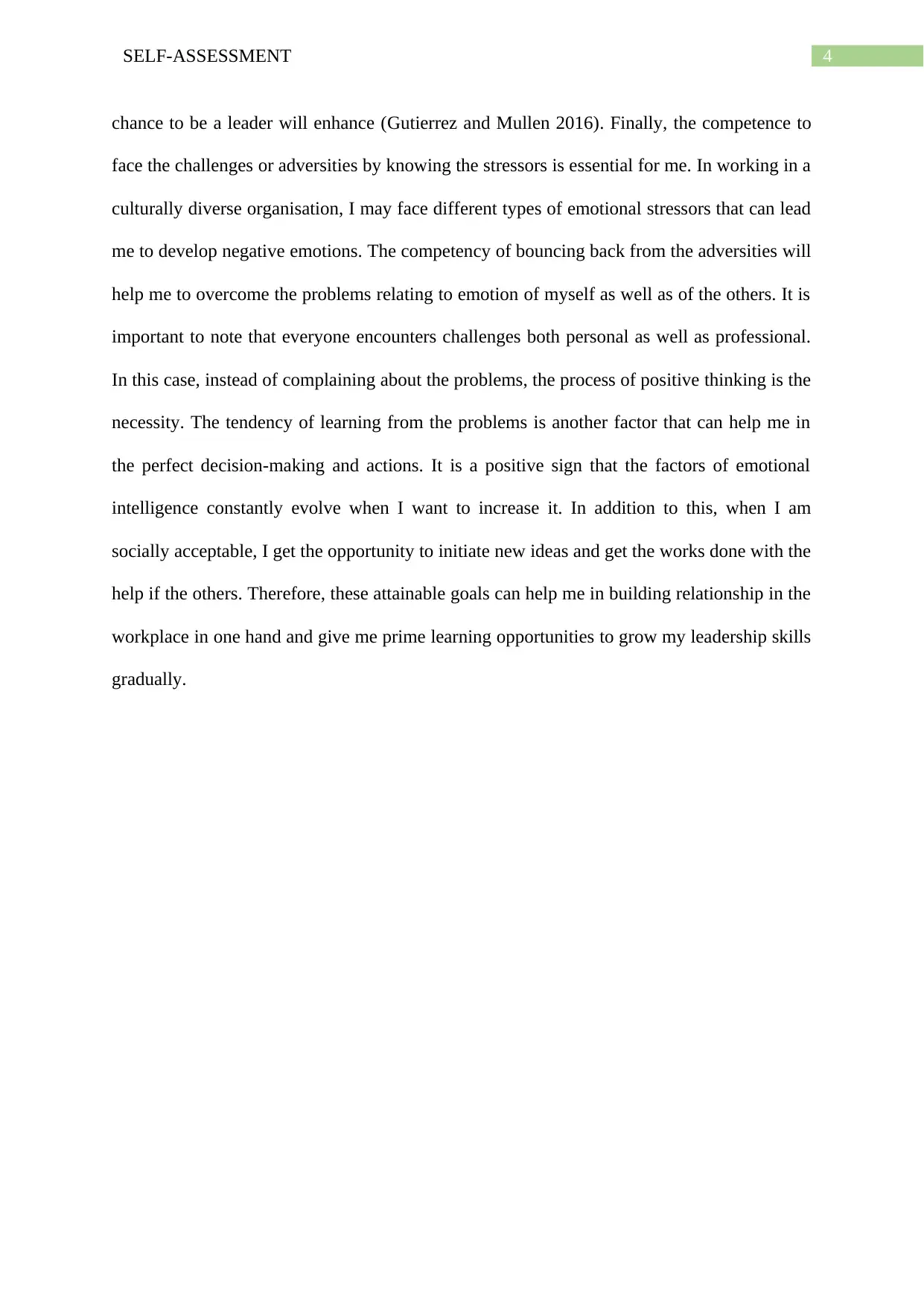
4SELF-ASSESSMENT
chance to be a leader will enhance (Gutierrez and Mullen 2016). Finally, the competence to
face the challenges or adversities by knowing the stressors is essential for me. In working in a
culturally diverse organisation, I may face different types of emotional stressors that can lead
me to develop negative emotions. The competency of bouncing back from the adversities will
help me to overcome the problems relating to emotion of myself as well as of the others. It is
important to note that everyone encounters challenges both personal as well as professional.
In this case, instead of complaining about the problems, the process of positive thinking is the
necessity. The tendency of learning from the problems is another factor that can help me in
the perfect decision-making and actions. It is a positive sign that the factors of emotional
intelligence constantly evolve when I want to increase it. In addition to this, when I am
socially acceptable, I get the opportunity to initiate new ideas and get the works done with the
help if the others. Therefore, these attainable goals can help me in building relationship in the
workplace in one hand and give me prime learning opportunities to grow my leadership skills
gradually.
chance to be a leader will enhance (Gutierrez and Mullen 2016). Finally, the competence to
face the challenges or adversities by knowing the stressors is essential for me. In working in a
culturally diverse organisation, I may face different types of emotional stressors that can lead
me to develop negative emotions. The competency of bouncing back from the adversities will
help me to overcome the problems relating to emotion of myself as well as of the others. It is
important to note that everyone encounters challenges both personal as well as professional.
In this case, instead of complaining about the problems, the process of positive thinking is the
necessity. The tendency of learning from the problems is another factor that can help me in
the perfect decision-making and actions. It is a positive sign that the factors of emotional
intelligence constantly evolve when I want to increase it. In addition to this, when I am
socially acceptable, I get the opportunity to initiate new ideas and get the works done with the
help if the others. Therefore, these attainable goals can help me in building relationship in the
workplace in one hand and give me prime learning opportunities to grow my leadership skills
gradually.
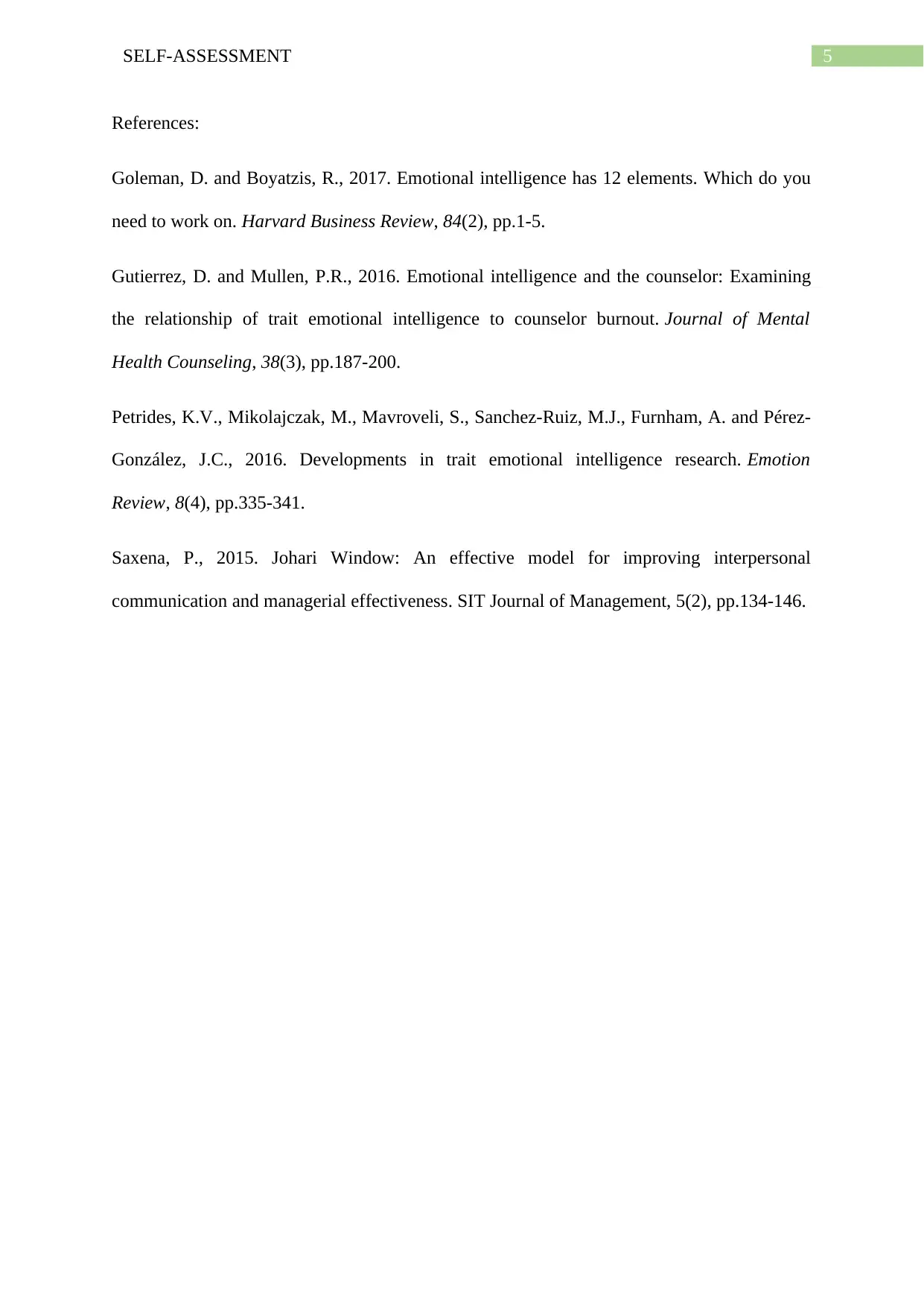
5SELF-ASSESSMENT
References:
Goleman, D. and Boyatzis, R., 2017. Emotional intelligence has 12 elements. Which do you
need to work on. Harvard Business Review, 84(2), pp.1-5.
Gutierrez, D. and Mullen, P.R., 2016. Emotional intelligence and the counselor: Examining
the relationship of trait emotional intelligence to counselor burnout. Journal of Mental
Health Counseling, 38(3), pp.187-200.
Petrides, K.V., Mikolajczak, M., Mavroveli, S., Sanchez-Ruiz, M.J., Furnham, A. and Pérez-
González, J.C., 2016. Developments in trait emotional intelligence research. Emotion
Review, 8(4), pp.335-341.
Saxena, P., 2015. Johari Window: An effective model for improving interpersonal
communication and managerial effectiveness. SIT Journal of Management, 5(2), pp.134-146.
References:
Goleman, D. and Boyatzis, R., 2017. Emotional intelligence has 12 elements. Which do you
need to work on. Harvard Business Review, 84(2), pp.1-5.
Gutierrez, D. and Mullen, P.R., 2016. Emotional intelligence and the counselor: Examining
the relationship of trait emotional intelligence to counselor burnout. Journal of Mental
Health Counseling, 38(3), pp.187-200.
Petrides, K.V., Mikolajczak, M., Mavroveli, S., Sanchez-Ruiz, M.J., Furnham, A. and Pérez-
González, J.C., 2016. Developments in trait emotional intelligence research. Emotion
Review, 8(4), pp.335-341.
Saxena, P., 2015. Johari Window: An effective model for improving interpersonal
communication and managerial effectiveness. SIT Journal of Management, 5(2), pp.134-146.
⊘ This is a preview!⊘
Do you want full access?
Subscribe today to unlock all pages.

Trusted by 1+ million students worldwide
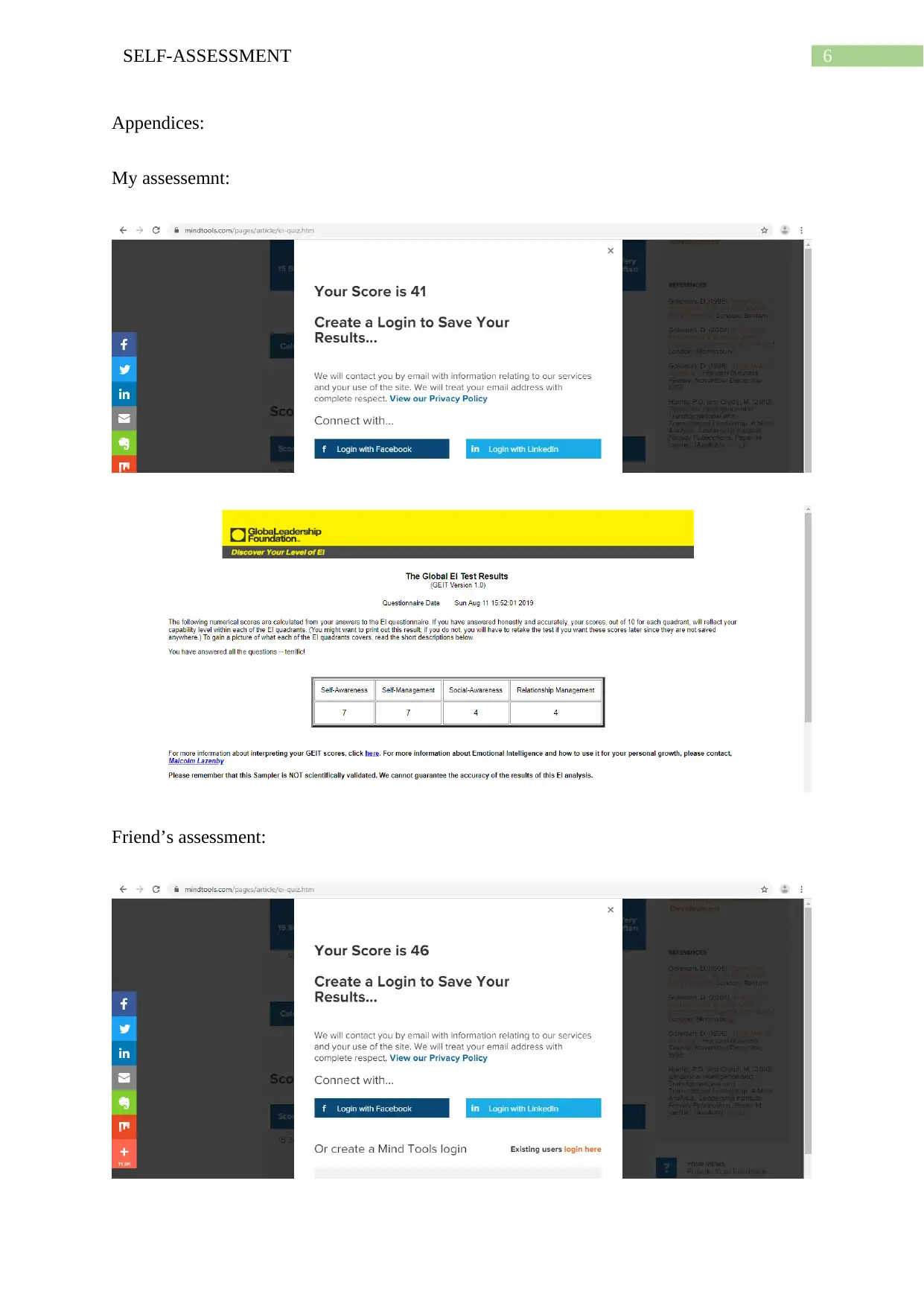
6SELF-ASSESSMENT
Appendices:
My assessemnt:
Friend’s assessment:
Appendices:
My assessemnt:
Friend’s assessment:
Paraphrase This Document
Need a fresh take? Get an instant paraphrase of this document with our AI Paraphraser
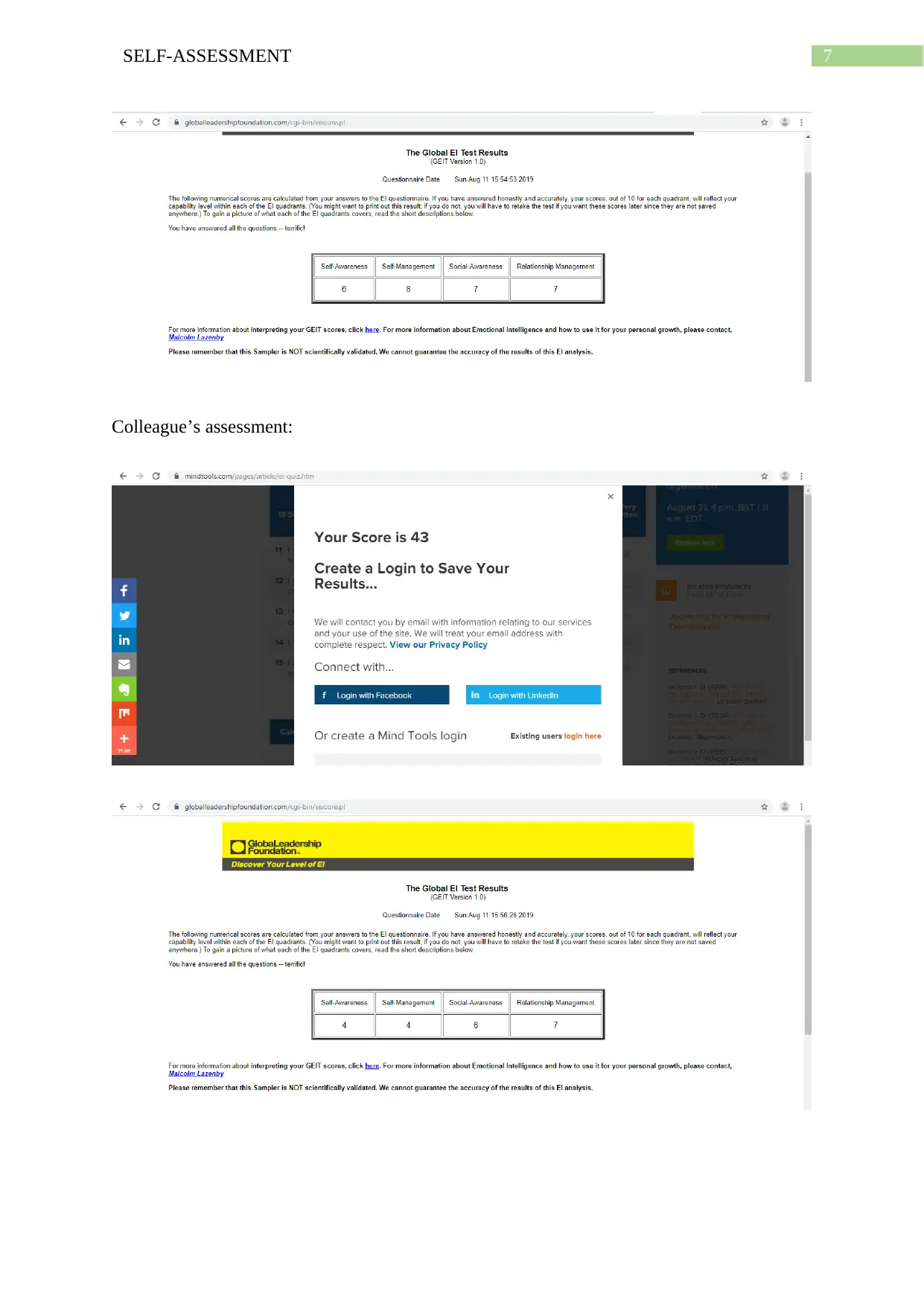
7SELF-ASSESSMENT
Colleague’s assessment:
Colleague’s assessment:
1 out of 8
Related Documents
Your All-in-One AI-Powered Toolkit for Academic Success.
+13062052269
info@desklib.com
Available 24*7 on WhatsApp / Email
![[object Object]](/_next/static/media/star-bottom.7253800d.svg)
Unlock your academic potential
Copyright © 2020–2025 A2Z Services. All Rights Reserved. Developed and managed by ZUCOL.





